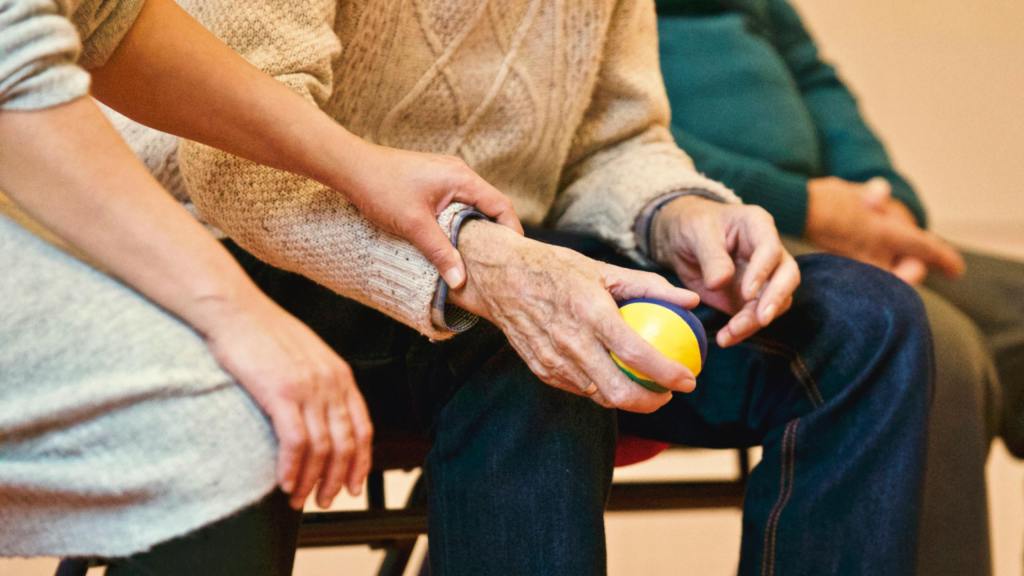
Your guide to the many different types of dementia
Alzheimer’s Disease
As mentioned, Alzheimer’s disease is the most common type of dementia and accounts for more than half (50 to 70%, some estimate up to 80%) of all dementia cases. Like all types of dementia, Alzheimer’s disease is a progressive disease. Those living with Alzheimer’s disease gradually progress through several stages:
- Preclinical Alzheimer’s disease, when symptoms are not noticeable to friends or family members
- Early stage dementia, when mild cognitive decline becomes apparent
- Mid-stage dementia, when symptoms become more severe and a person requires assistance with day-to-day activities
- Late-stage dementia, when cognitive decline is so severe that a person loses the ability to communicate and requires around-the-clock care
There are some genetic factors linked to an increased risk of developing Alzheimer’s disease, but scientists have not yet discovered a single, definitive cause. Other risk factors include metabolic diseases, such as obesity and diabetes, as well as vascular conditions such as heart disease, stroke, and high blood pressure. While these factors aren’t believed to cause Alzheimer’s disease directly, there is some correlation between people who have these conditions and those who develop Alzheimer’s disease. Some lifestyle factors can impact the risk of developing Alzheimer’s disease, as well. Staying physically active, consuming a nutritious, balanced diet, social engagement, and engaging in mentally stimulating activities throughout life may reduce a person’s risk of developing the disease. There is no cure for Alzheimer’s disease, although there are a few medications that may slow the progression of the disease and help to reduce some symptoms. These medications work best when prescribed during the earlier stages of the disease.
Parkinson’s Disease
Parkinson’s disease is a progressive nervous system disorder with symptoms including slow movement, tremors, rigid muscles, impaired balance and posture, changes to speech, and a loss of automatic movements such as blinking and smiling. Parkinson’s disease affects approximately 2% of people over age 65. An estimated one million Americans are living with Parkinson’s disease. As the brain changes caused by Parkinson’s disease gradually spread, a person may develop Parkinson’s disease dementia, affecting memory, attention, judgement and planning capabilities. Parkinson’s disease dementia appears at least one year following a person’s diagnosis and is marked by a decline in thinking and reasoning. Parkinson’s disease dementia affects approximately 50% to 80% of those with Parkinson’s disease. Parkinson’s disease results from a loss of neurons in the brain that produce dopamine. Decreased levels of dopamine leads to abnormal brain activity, resulting in the symptoms of Parkinson’s disease. Like Alzheimer’s disease, Parkinson’s disease has no clearly established cause, although there are some factors linked to risk, including certain genetic mutations, gene variations, and environmental triggers such as exposure to toxins. People who have a close relative with Parkinson’s disease may have an increased risk. The risk of developing Parkinson’s disease increases with age, and most people diagnosed with the disease are 60 or older. Men are more likely to develop Parkinson’s disease than women. There is no standard treatment for Parkinson’s disease; instead, treatment is based on symptoms. There are no medications that can reverse the disease, although some medications do reduce symptoms. Patients may also be advised to get adequate rest and regular exercise.
Huntington’s Disease
Huntington’s disease is a genetic disorder causing the progressive breakdown of nerve cells in the brain. The disease deteriorates a person’s physical and mental abilities, often during their prime working years, as it typically presents between the ages of 30 and 50, making the disease particularly devastating. Huntington’s disease is fatal, and there is no known cure. Every child of a parent who has Huntington’s disease has a 50/50 chance of also developing the disease. An estimated 30,000 people in the U.S. are currently living with symptomatic Huntington’s disease, and another 200,000 people are at risk of inheriting the disease. As Huntington’s disease progresses, it impacts a person’s ability to walk, speak, and reason. Changes in the brain result from a defective huntingtin protein which can be toxic to brain cells. Over time, these impacts spread from the basal ganglia to other regions of the brain, causing abnormal involuntary movements, mood changes such as irritability and depression, and a severe decline in thinking and reasoning skills. Symptoms gradually worsen over a 10- to 25-year period, with the average length of survival between 10 and 20 years after diagnosis. As there is currently no cure for Huntington’s disease and no treatment that can slow the progression of the disease, treatment focuses on symptom management.
Lewy Body Dementia
Caused by protein deposits in nerve cells, Lewy body dementia is characterized by memory loss and disorientation. Changes to sleep patterns, such as difficulty falling asleep at night and suddenly falling asleep unexpectedly during the day, are also common, as well as visual hallucinations, trembling, weakness, and difficulty walking. Lewy body dementia most commonly affects those over age 50. Symptoms closely resemble the symptoms of Alzheimer’s disease and Parkinson’s disease, which can make diagnosis challenging. Lewy body dementia is one of the most common causes of dementia among the elderly (accounting for 5-10% of dementia cases), and it’s the third most common type of dementia overall, behind Alzheimer’s disease and vascular dementia. The average length of survival is five to seven years following diagnosis. Like many other types of dementia, there is no cure for Lewy body dementia. However, some of the medications used to slow the progression of Alzheimer’s disease and reduce symptoms may be used in the treatment of Lewy body dementia, with the goal of managing symptoms.
Vascular Dementia
Vascular dementia is the second most common type of dementia, accounting for 5% to 10% of all dementia cases. Unlike Alzheimer’s disease and Lewy body dementia, which result from changes in the brain over time, vascular dementia is caused by conditions that reduce or block blood flow to different regions of the brain, which deprives the brain of vital oxygen and nutrients. As such, vascular dementia can arise suddenly, such as following a stroke. That said, vascular dementia may also start as mild changes that progress over time. This can result from multiple smaller strokes over time or from conditions that affect small blood vessels and gradually cause widespread damage. The symptoms of vascular dementia range from mild to severe and can vary a great deal depending on the region of the brain that has been affected. For instance, memory deficits may not be present at all, while in other cases, memory loss can be the most significant symptom if blood flow was restricted to the parts of the brain responsible for memory storage and retrieval. Symptoms can include confusion, disorientation, difficulty with speech (both speaking and understanding), poor balance, and difficulty walking. When resulting from a stroke, common stroke symptoms such as a sudden, severe headache and numbness or paralysis on one side of the body are also common. There are many causes that can lead to vascular dementia, including any condition or event that disrupts blood flow to parts of the brain. This may include physical accidents and other medical conditions that impede blood flow suddenly or gradually. Treatment is focused on preventing vascular dementia from worsening by treating underlying conditions such as hypertension or diabetes. There are no drugs designed specifically to treat vascular dementia, although some drugs used to treat the symptoms of Alzheimer’s disease have shown some promise in clinical trials. Controlling risk factors may also help to reduce further decline, such as quitting smoking, regular exercise, eating a healthy, balanced diet, maintaining a healthy weight, and limiting alcohol consumption.
Frontotemporal Dementia (FTD)
Frontotemporal dementia occurs when nerve cells in the frontal (behind the forehead) and temporal (behind the ears) regions of the brain are lost, causing the frontal and temporal lobes to shrink. Damage to nerve cells leads to a loss of function in these brain regions, leading to changes in behaviors and capabilities. Changes in personality and difficulty speaking or understanding speech are common, as well as changes in motor skills such as weakness and slowing of movement. It’s the most common form of dementia affecting those under age 60. There are several sub-types of frontotemporal dementia based on the pattern of symptoms and other indicators. Frontotemporal dementia is commonly misdiagnosed as Alzheimer’s disease, vascular dementia, or Parkinson’s disease, as well as psychiatric disorders such as obsessive-compulsive disorder, bipolar disorder, or schizophrenia. Due to these common misdiagnoses, it takes an average of 3.6 years for those with FTD to get an accurate diagnosis. There are currently an estimated 60,000 people with FTD in the U.S. There is no known cure for frontotemporal dementia and no way to halt or reverse the progression of the disease. Treatments aim to reduce symptoms, and lifestyle changes may also be recommended to aid in managing symptoms and improve quality of life.
Posterior Cortical Atrophy (PCA)
Posterior cortical atrophy is a type of dementia characterized by the gradual, progressive degeneration of the brain’s cortex, or the outer layer of the brain in the posterior region of the brain (the back of the head). It’s not yet been determined whether posterior cortical atrophy is a separate disease or a variant of Alzheimer’s disease. Additionally, there’s no standard definition of the disease, and no established diagnostic criteria, making it difficult to determine how many people are affected by it. In some studies, about 5% of people with Alzheimer’s disease have been found to have posterior cortical atrophy. That said, it often goes unrecognized, so some estimate that the prevalence may be as high as 15% of those with Alzheimer’s disease. The symptoms of posterior cortical atrophy vary from person to person, and symptoms may change as the disease progresses. Because the posterior cortex of the brain is the region responsible for processing visual information, symptoms commonly include difficulties with visual tasks. People with posterior cortical atrophy may have trouble reading a line of text, for example, or have difficultly judging distance or distinguishing stationary objects from moving objects. They may experience disorientation and have trouble recognizing and using common tools such as forks, writing utensils, or toothbrushes, as well as difficulty recognizing familiar faces. Double vision, difficultly seeing in dim lighting conditions, sensitivity to bright light or shiny surfaces, and difficulty reaching out and grasping objects are also common symptoms. Some people with posterior cortical atrophy experience hallucinations. PCA is believed to be caused most often by Alzheimer’s disease, although it may also be caused by Lewy body dementia or Creutzfeldt-Jakob disease. As such, PCA is treated in the same manner as Alzheimer’s disease, with the use of some drugs designed to reduce symptoms or slow progression. Interestingly, the onset of symptoms tends to occur at an earlier age compared to the symptoms of Alzheimer’s disease, with most people experiencing the first symptoms in their mid- to late-50s or early 60s. Most people with PCA live an average of 10 to 12 years after the onset of symptoms, similar to those with Alzheimer’s disease, and some live even longer.
Normal Pressure Hydrocephalus (NPH)
Normal pressure hydrocephalus is a brain disorder characterized by the accumulation of excess cerebrospinal fluid (CSF) in the ventricles of the brain. Problems with thinking and reasoning, difficulty walking, and loss of bladder control are common. As the brain’s ventricles enlarge with excess CSF, nearby brain tissue may be disrupted or damaged, resulting in symptoms of dementia and cognitive deficits. Diagnosis may be challenging because the symptoms of NPH are similar to the symptoms of Alzheimer’s disease and Parkinson’s disease. While some people develop NPH with no known cause, some cases can be caused by bleeding around the brain caused by a head injury or stroke, while others may be caused by infections such as meningitis. In addition to difficulty walking, people with normal pressure hydrocephalus may experience confusion, short-term memory loss, and difficulty with attention. They may also experience mood changes and lose interest in daily activities. NPH can be treated with a surgically placed shunt, designed to drain excess fluid to the abdomen from the brain. While the placement of a shunt can improve a person’s ability to walk, improvements in cognitive symptoms are less likely. NPH occurs most often in people over age 60, and it’s estimated that up to 10% of people with dementia who have been diagnosed with other disorders may actually have NPH.
Creutzfeldt-Jakob Disease (CJD)
A rare and degenerative brain disorder, Creutzfeldt-Jakob disease is fatal. This extremely rare disease affects only an estimated one person out of every one million people each year worldwide. In the U.S., there are about 350 people who develop the disease each year. Typically appearing later in life with rapid progression, Creutzfeldt-Jakob disease is characterized by behavior changes, memory problems, visual disturbances, and a lack of coordination. Symptoms become more severe as the disease progresses, including involuntary movements, weakness in the extremities, blindness, and coma. CJD is a transmissible spongiform encephalopathy (TSE), also known as a prion disease, and it’s the most common TSE that affects humans. The disease is believed to be caused by abnormal forms of normal cellular proteins, which are called prions. Risk factors include age, genetics, and exposure to contaminated tissue. While the symptoms of CJD are similar to the symptoms of Alzheimer’s disease, it progresses much more rapidly, typically resulting in death within one year. Sadly, there is no known way to prevent sporadic CJD, and treatments aim to relieve symptoms and keep the patient comfortable.
Wernicke-Korsakoff Syndrome
Commonly referred to as simply Korsakoff Syndrome, Wernicke-Korsakoff Syndrome is a chronic memory disorder caused by thiamine (vitamin B-1) deficiency. Alcohol misuse is believed to be the most common cause of Korsakoff Syndrome, although it may also be associated with anorexia or strict fasting, starvation, or weight-loss surgery, kidney dialysis, AIDS, chronic infection, or metastatic cancer that has spread throughout the body. Researchers have identified some genetic variations that may contribute to an individual’s risk of developing Korsakoff Syndrome. Poor nutrition is another common risk factor. The symptoms of Wernicke-Korsakoff Syndrome include difficulty learning new information, long-term memory gaps, and an inability to remember recent events. Despite severe memory deficits, other cognitive and social skills may be mostly unaffected. As a result, it’s possible for a person with Korsakoff Syndrome to engage in a detailed discussion, only to forget what was discussed and with who moments after the interaction. Another hallmark of Korsakoff Syndrome is confabulation – or filling in details of stories or information with details that are false. People with Korsakoff Syndrome are not intentionally lying; in fact, they may believe that the information they’ve made up to fill in missing details is accurate. People with Wernicke-Korsakoff Syndrome may also experience auditory hallucinations. Treatment for Korsakoff Syndrome includes supplements such as thiamine (to correct the deficiency), magnesium, and other vitamins, which may reduce some symptoms. People with Korsakoff syndrome are advised to abstain from alcohol and eat a healthy, balanced diet. If these measures don’t improve symptoms, healthcare providers may focus on treating comorbid conditions, and support services and accommodations may be considered, depending on the severity of symptoms.
Mixed Dementia
A person who has more than one form of dementia may be described as having mixed dementia. Signs and symptoms vary depending on how far the conditions have progressed but may include a mix of the symptoms typical for each form of dementia. Because the symptoms of various types of dementia are often similar, symptoms associated with mixed dementia may simply be overlooked and attributed to the type of dementia they’ve been diagnosed with. Alzheimer’s disease may be the most common type of dementia, but it’s important to understand the various conditions and diseases that could be contributing to your loved one’s symptoms. Having the right diagnosis can help you prepare for what’s to come and evaluate all the possible treatment options that could alleviate symptoms or, in some cases, possibly slow the progression of the disease.
Further Reading on the Types of Dementia
Visit these resources for more information on the various types of dementia:
- Clinical Differences Among Four Common Dementia Syndromes
- Distinguishing Different Dementias
- Distinguishing Alzheimer’s disease from other major forms of dementia
- 13 Kinds of Diseases that Cause Dementia
- Different types of dementia
- Lesser Known and Rare Types of Dementia
- Types of dementia
- What are the other types of dementia?
More insights like this:
-

Delirium vs. Dementia: Causes, Symptoms, Treatments, and Preventative Measures
Read more: Delirium vs. Dementia: Causes, Symptoms, Treatments, and Preventative Measures5 Key Things Family Caregivers Need to Know About Delirium and Dementia Onset and Course Are Key Clues That Caregivers Should Watch Closely Delirium develops suddenly (hours or days) and often fluctuates; dementia progresses gradually over months or years. Acute changes in thinking or attention should trigger urgent medical evaluation. Delirium and Dementia…
-

What Caregivers Should Know About Early-Onset Alzheimer’s
Read more: What Caregivers Should Know About Early-Onset Alzheimer’sSymptoms, Stigma, Diagnosis, and Treatment Early-onset Alzheimer’s disease, also known as younger-onset, is the development of Alzheimer’s symptoms between the ages of 30 and 65. A diagnosis is relatively rare at a younger age, and while over 6 million people in the United States are living with Alzheimer’s disease, the true prevalence of early-onset is uncertain.…
-

15 Tips on Transitioning a Loved One to Memory, Dementia, or Alzheimer’s Care
Read more: 15 Tips on Transitioning a Loved One to Memory, Dementia, or Alzheimer’s CareAs a part of your journey caring for someone with Alzheimer’s or another form of dementia, there may come a time when the effects of the disease become too much for a caregiver to handle, and one must seek alternative care options. When deciding the right time to transition your loved one to…